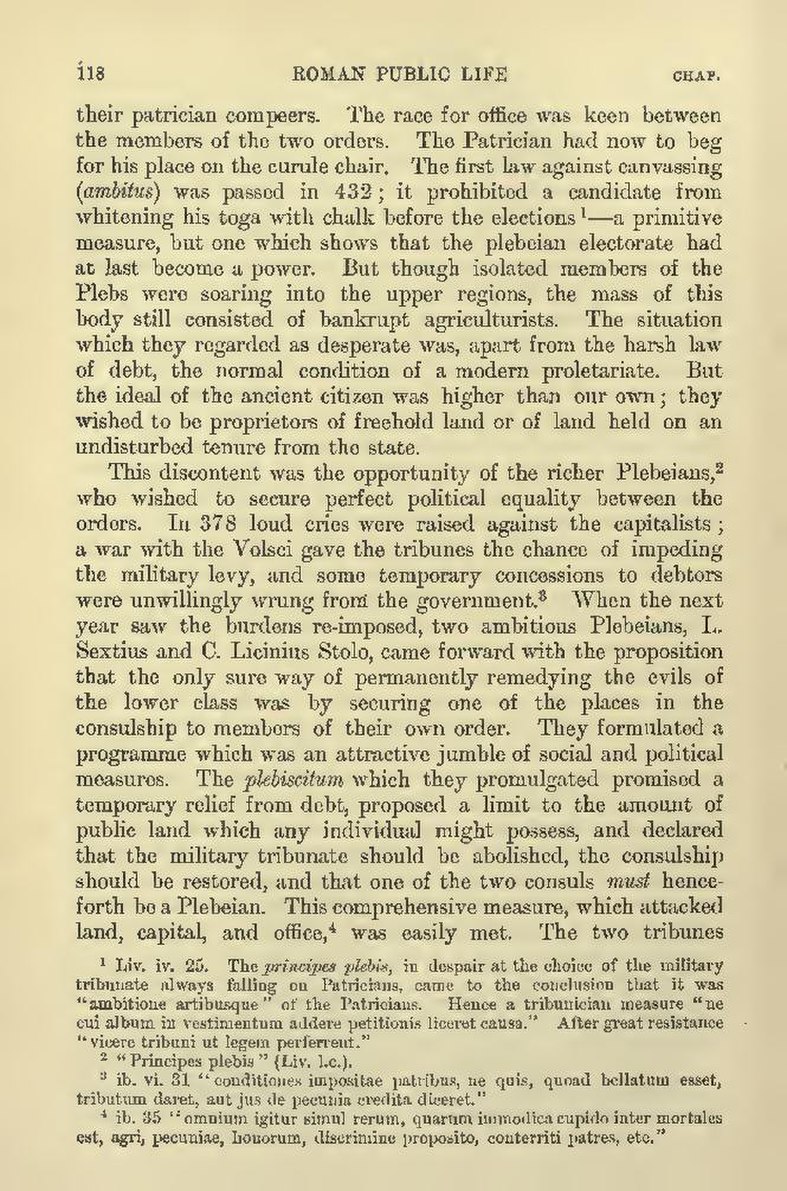their patrician compeers. The race for office was keen between the members of the two orders. The Patrician had now to beg for his place on the curule chair. The first law against canvassing (ambitus) was passed in 432; it prohibited a candidate from whitening his toga with chalk before the elections[1]—a primitive measure, but one which shows that the plebeian electorate had at last become a power. But though isolated members of the Plebs were soaring into the upper regions, the mass of this body still consisted of bankrupt agriculturists. The situation which they regarded as desperate was, apart from the harsh law of debt, the normal condition of a modern proletariate. But the ideal of the ancient citizen was higher than our own; they wished to be proprietors of freehold land or of land held on an undisturbed tenure from the state.
This discontent was the opportunity of the richer Plebeians,[2] who wished to secure perfect political equality between the orders. In 378 loud cries were raised against the capitalists; a war with the Volsci gave the tribunes the chance of impeding the military levy, and some temporary concessions to debtors were unwillingly wrung from the government.[3] When the next year saw the burdens re-imposed, two ambitious Plebeians, L. Sextius and C. Licinius Stolo, came forward with the proposition that the only sure way of permanently remedying the evils of the lower class was by securing one of the places in the consulship to members of their own order. They formulated a programme which was an attractive jumble of social and political measures. The plebiscitum which they promulgated promised a temporary relief from debt, proposed a limit to the amount of public land which any individual might possess, and declared that the military tribunate should be abolished, the consulship should be restored, and that one of the two consuls must henceforth be a Plebeian. This comprehensive measure, which attacked land, capital, and office,[4] was easily met. The two tribunes
- ↑ Liv. iv. 25. The principes plebis, in despair at the choice of the military tribunate always falling on Patricians, came to the conclusion that it was "ambitione artibusque" of the Patricians. Hence a tribunician measure "ne cui album in vestimentum addere petitionis liceret causa." After great resistance "vicere tribuni ut legem perferrent."
- ↑ "Principes plebis" (Liv. l.c.).
- ↑ ib. vi. 31 "conditiones impositae patribus, ne quis, quoad bellatum esset, tributum daret, aut jus de pecunia credita diceret."
- ↑ ib. 35 "omnium igitur simul rerum, quarum immodica cupido inter mortales est, agri, pecuniae, honorum, discrimine proposito, conterriti patres, etc."
